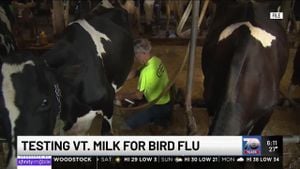On Monday night, sports analysts Adam Schefter and Doug Gottlieb found themselves embroiled in an unexpected Twitter feud, igniting discussions about reporting standards and the realities of college athletics.
It all started when Schefter, known for his NFL insights on ESPN, reported rumors surrounding Michael Vick’s potential hiring as the head coach for Sacramento State. He claimed the school was actively pursuing Vick and touted the impressive figure of $50 million collected through NIL (Name, Image, and Likeness) funds, aimed at bolstering the football program as they eyed moving up to the next level of competition.
Gottlieb, who is now coaching the men’s basketball team at the University of Wisconsin-Green Bay, saw the report and wasted no time weighing in. Using the platform X (formerly Twitter), Gottlieb stated boldly, “Jeezus Shefty, edit what agents tell you… 0.0% chance Sac State has $50m in NIL.” His sarcastic tone set the stage for what would become quite the heated exchange.
Gottlieb's skepticism about the reported $50 million caught the eyes of many, and it wasn't long before Schefter responded. Addressing Gottlieb’s criticism, he cited the SAC-12, which is the group leading Sacramento State's NIL fundraising efforts. Schefter insisted, “The SAC-12 leading the schools NIL efforts already announced it has reached its initial goal of raising $50 million...”
This wasn't the end of the matter for Schefter. Taking it up a notch, he pointed out Gottlieb's struggles as the head coach of the Phoenix, emphasizing their current state of disarray with their 0-3 record within their conference and the heat of seven consecutive losses. Schefter's retort was fierce: “And Jeezus, Doug. A seven-game losing streak and last place in the Horizon League? Less time on social media and more time in the gym.”
The social media spat was more than just back-and-forth banter; it highlighted the sensitive relationship between sports reporting and the pressures faced by coaches, particularly when poor performance casts shadows over their credibility. Gottlieb, who has continued to juggle his coaching duties alongside his radio show, found himself on the defensive. While Gottlieb countered, asserting he spends plenty of time working on the court and remains focused on building his team, the underlying tensions were evident as they clashed publicly.
Interestingly, Gottlieb’s skepticism wasn't merely rooted in disagreement over Schefter's word. Speculations arose surrounding the legitimacy of Sacramento State's $50 million figure. Some have suggested it’s misleading, as it implies hard cash available immediately, when really, it’s more about future commitments spread over ten years. According to discussions around the funding, the money’s availability hinges on the school's ability to reach its goal of moving up to FBS (Football Bowl Subdivision) status.
The Sacramento Bee later reported officials from Sacramento State acknowledged the interest from Vick but also described Schefter's reporting as premature. Sacramento State President Luke Wood shared details of his meeting with Vick on X, stating, “Vick and I did meet about Sac State football and our athletic rise... Announcements on several major decisions coming soon.” Mitigated by this comment, it remains to be seen how this narrative evolves.
Both Schefter and Gottlieb are entrenched figures within their realms. Schefter has built his reputation by breaking news and providing updates on everything from player trades to coaching changes, boasting extensive networking connections. Gottlieb, on the other hand, is trying to build his coaching legacy, all the more challenging under such scrutiny. The backdrop was the stark realities of college athletics — where coaching can feel as precarious as it is rewarding — showcased by Gottlieb's early struggles with the Phoenix, who sit at 2-10 overall, including two wins against relatively lesser competition.
The Twitter exchange has raised eyebrows across the sports community, serving as more than entertainment. It reflects the complicated web of relationships, perception, and the fast-paced world of sports journalism, where the lines between skepticism and accountability can blur greatly.
Regardless, as the drama unfolded, one thing became abundantly clear: for all their professional accolades, both Schefter and Gottlieb are also very much human, grappling with their respective pressures. Their online exchanges serve as reminder of how digital platforms allow disagreements to play out publicly, prompting reactions far beyond the screen.
Fans and followers now wait to see how this feud develops, with several questions left unanswered. Will Gottlieb’s basketball team find their footing? How will Sacramento State’s coaching search pan out as more voices join the conversation? And will Schefter continue to clash with other analysts questioning the validity of his sources?
Perhaps most intriguingly, will this Twitter spat evolve beyond social media, shaping future interactions between these two sports figures as their careers progress? The sporting world continues to hold its breath, eager for the next chapter.



